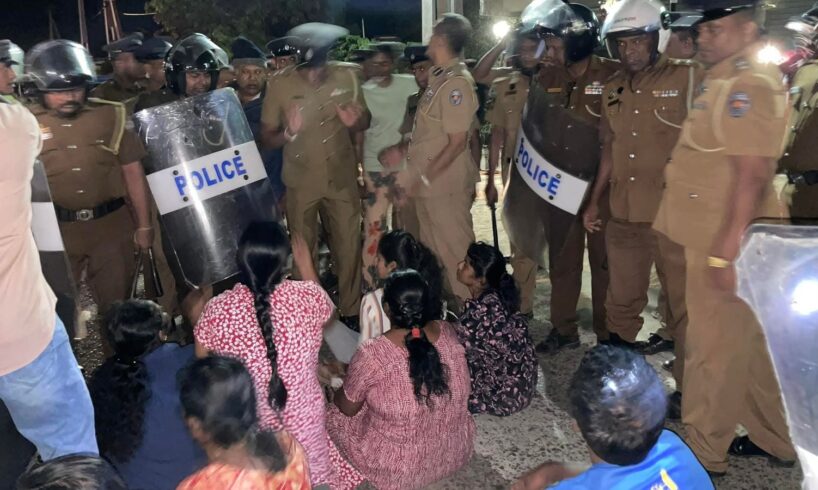
Rally opposing police attack on a protest against the wind power plant in Mannar [Photo: Facebook/Wasantha Mudalige]
On September 29, thousands of workers, fishermen, youth and women participated in a mass shutdown demonstration in Mannar District, of Sri Lanka’s war-ravaged north, to condemn a brutal police attack on a peaceful nighttime protest over a wind-power project held on September 26. Monday’s event was organised by the Mannar Citizens Committee.
Leaders of the Mannar Citizens Committee presented a letter to the district’s chief government administrator to be sent to President Anura Kumara Dissanayake. The letter called for an investigation into the police attack and reiterated longstanding demands that the government halt the wind-power scheme. Residents oppose the project because of its detrimental impact on the environment and their living conditions.
In August, President Dissanayake met with Mannar Citizens Committee leaders, assuring them that he would delay the project until the environmental problems it caused were resolved.
However, on the evening of September 26, residents learned that wind turbines were, in fact, being transported to the construction site. At around 10 p.m., hundreds of peaceful protesters gathered, staging a sit-down on the main road into Mannar town and blocking transportation.
Protesters shouted slogans and argued with the police, accusing Dissanayake of betraying their demand to halt the project. Hundreds of armed police officers, including members of the notorious Special Task Force, brutally attacked the protesters with batons and shields. Several people, including women, were injured in the assault and hospitalised.
The next day, police filed a case in the Mannar Magistrate’s Court against nine protesters, including three who were injured in the assault, and Mannar Citizens Committee president, clergyman Marcus Adigalar. The case will be heard on November 17.
The latest police attack followed nearly two months of protests by Mannar residents, who have been subjected to various forms of police harassment.
Police confront wind power plant protesters in Mannar [Photo: Facebook/Roobam Media Groups]
Mannar is a 130-square-kilometre island connected to the mainland via a causeway. The majority of its 70,000 residents are Tamil, with a significant Muslim community. During Colombo’s brutal communal war (1983–2009) against the Liberation Tigers of Tamil Eelam, the population suffered ruthless military repression. A large mass grave was discovered in Mannar town, containing about 346 human skeletons, including those of 29 children.
The Ceylon Electricity Board (CEB) launched the first phase of the wind power project with World Bank aid in March 2019, after obtaining Environmental Impact Assessment (EIA) approval from the Central Environmental Authority (CEA).
Wind turbine operations, however, led to declining fish populations, flooding caused by construction blocked the flow of water to the sea, and there was disruption to migratory bird patterns. Residents, many of whom rely on fishing for their livelihood, reported a drastic reduction in their catch. When the second phase of the project was proposed, the CEA submitted an impact assessment that specifically raised concerns about these issues.
The former Wickremesinghe government signed an agreement with a green energy company owned by Indian multibillionaire investor Gautam Adani to build the project. The deal sparked controversy because it was signed without securing CEA clearance regarding its ecological suitability.
During last year’s election campaigns, Dissanayake and his Janatha Vimukthi Peramuna/National People’s Power (JVP/NPP) vocally opposed the project, citing ecological risks and arguing that handing it over to a foreign company would undermine Sri Lanka’s “energy sovereignty.” This nationalist rhetoric—tinged with the JVP’s pervasive anti-Indian chauvinism—sought to exploit mass opposition in the Mannar area to win votes.
After coming to power in 2024, however, the Dissanayake regime reversed its stance on the Adani deal and entered discussions over electricity pricing. The Adani company eventually withdrew from the deal in February.
In May, the Dissanayake government signed a new agreement with one of Sri Lanka’s major conglomerates, the Hayleys Group, and its subsidiary Hayleys Fentons, to build the project. Residents immediately resumed protests, as their original concerns remained unaddressed.
On August 13, protest leaders met with Dissanayake, who assured them that the project would not resume until a special committee’s report had been considered.
However, after reviewing the report, the president’s secretary, Dr. N.S. Kumanayake, reportedly wrote to the Ministry of Energy on September 22, authorising recommencement. Outraged residents—who had not been informed of the government’s decision—attempted to block the transport of wind turbines into the area.
Fishermen in Mannar complain of a sharp decline in fish catches during the first phase of the project. Where they once enjoyed plentiful harvests, fish quantities have diminished—particularly in areas of seabed affected by turbine operations along the coastline.
Residents also reported severe flooding in the Pesalai area, a few kilometres from the site, during the monsoon season. The foundations of the wind turbines obstructed natural water streams. Reports indicate that when the project was constructed, culverts were not properly installed to facilitate water flow.
Adding to local anger is Colombo’s repeated attempt to promote the excavation of mineral-rich sands in the area. Australian company Titanium Sands Limited (TSL) has held a survey license since 2022.
Scientific studies show that Mannar Island holds valuable minerals such as ilmenite, rutile, zircon and garnet. According to the Colombo-based Sunday Times, the Geological Survey and Mines Bureau (GSMB) estimates that the area contains 53 million metric tons of these minerals.
TSL is currently in talks with the GSMB to secure a mining license, pending an environmental impact assessment, which has yet to be finalised due to community protests. Company director Jason Ferris told the Times that TSL has invested 2 billion rupees (US$6.6 million) so far and plans to invest 24 billion rupees once a license is granted. Reflecting growing opposition, young people held a protest in Mannar on August 6 under the slogan “Protect Black Soil.”
Following the mass demonstration on September 29, the Janodanaya Movement—a civil rights group allied with the ruling JVP-led NPP—issued a statement on Thursday “strongly” condemning the police attack. It declared that “the people had placed their trust and confidence in the NPP government,” but that the police violence would sow mistrust.
In a blatant political cover-up, the Janodanaya Movement claimed the police attack “raises the grave question of whether conspiratorial forces still embedded within the police are deliberately working to create division and hostility [against the government].”
The Dissanayake government, however, unleashed the latest attack as part of its effort to suppress the growing mass opposition across the country to its administration. It is false to claim that the police acted independently. The government, having approved the Hayleys investment, would have ordered the police to use force to crush resistance to its corporate deals.
On August 24, the government deployed police and the army to break a week-long national strike by postal workers, and on September 21, it invoked the Essential Services Act to threaten CEB employees protesting privatisation and job cuts. These are just two examples of how the government has violently suppressed workers and protesters in recent months.
Janodanaya Movement spokespeople have warned Mannar residents to beware of “power-hungry forces” attempting to exploit their grievances. This is a cynical diversion. In truth, it was the JVP/NPP that exploited those grievances to win power—only to betray them once in office.
Leaders of all the Tamil political parties—including the Ilankai Tamil Arasu Kachchi, Tamil National People’s Front and Tamil National Party—have issued token statements condemning the police attack and warning against “state terrorism.”
These claims are hollow. These parties—and the rest of the parliamentary opposition—support the government’s IMF-backed austerity policies, claiming they are necessary for “economic recovery.” The brutal police assault on the people of Mannar and the broader repression of workers and the poor is further evidence of the government’s shift toward dictatorial forms of rule.
The fight to defend the environment, living conditions and basic democratic rights against government repression and its big-business program requires the development of a unified movement of the working class across ethnic lines, based on an anti-capitalist and socialist program.
Sign up for the WSWS email newsletter





